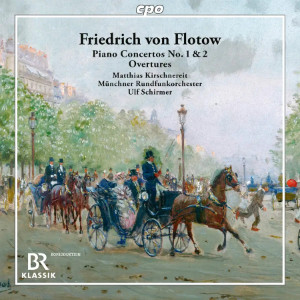
Friedrich von Flotow (1812-1883)
Piano Concerto No. 1 in C Minor
Piano Concerto No. 2 in A Minor
Overtures:
Wintermärchen
Fackeltanz
La Veuve Grapin
Rübezahl
Alessandro Stradella
Matthias Kirschnereit (piano)
Münchner Rundfunkorchester/Ulf Schirmer
rec. 2020, BR Studio 1, Munich
cpo 555 372-2 [65]
Rob Barnett (review) and Dave Billinge (review) both reviewed the same good recording of the two piano concertos on the Sterling label back in 2009 and 2016 respectively. Both enjoyed the music but DB pointed out a technical problem with the CD whereby the channels were reversed; certainly there is no such problem with this new issue from CPO, which is in excellent sound.
Having recently posted a survey of recordings of Flotow’s one enduring work, Martha, I was intrigued to hear this disc. Both are sparkling, upbeat works in C minor with lyrical slow movements, as one might expect from any acquaintance with his opera, and they exude the exuberance of a composer who was still in his late teens when he wrote them. They are not especially memorable musically speaking but they are given the best possible advocacy by the team here, and if the thought occasionally crosses the listener’s mind that they are a little facile and showy, they are so brief and concentrated at fifteen and seventeen minutes respectively that there is no time to become bored. They are perhaps primarily reminiscent of Chopin at his most sentimental but those slow movements have more than a hint of the young Beethoven about their. The finale of No. 1 is especially engaging, alternating between rippling arpeggios and jaunty hops, and Schirmer’s playing is winningly mercurial. The opening of No. 2 is the most Beethovenian movement of all, its cascading phrases both serious and rapturous before evolving into a brilliant military march. It is a more complex and varied work than No. 1, not just in terms of its music but in having four very different movements as opposed to the three of the first concerto. The perky Scherzo is played with rhythmically pointed, puckish glee by both pianist and orchestra and the Adagio has the easy melodic accessibility we know from Martha; the mood of bouncy affability we heard in the Scherzo returns in the Rondo finale.
The overtures return us to the world of Flotow’s opera and anyone can hear the influence of Weber and Mendelssohn’s A Midsummer Night’s Dream in the overture taken from his incidental music for Wintermärchen (Shakespeare’s The Winter’s Tale) and Fackeltanz (a Torch Dance composed for royal wedding festivities). The overture to the operetta La Veuve Grapin is cheerful and undemanding and the two concluding opera overtures genial and enjoyable. In his lifetime, Alessandro Stradella was almost as popular as Martha but has long since fallen into obscurity. Its deployment of horns is atmospheric and the music has a certain new grandeur absent from the other pieces. It is beautifully played and conducted.
A long, indeed, exhaustive note – mainly biographical, but with some musical commentary – sometimes rather arch in tone, by Eckhardt van der Hoogen provides detailed background information about the composer’s life.
Ralph Moore
Help us financially by purchasing from



















